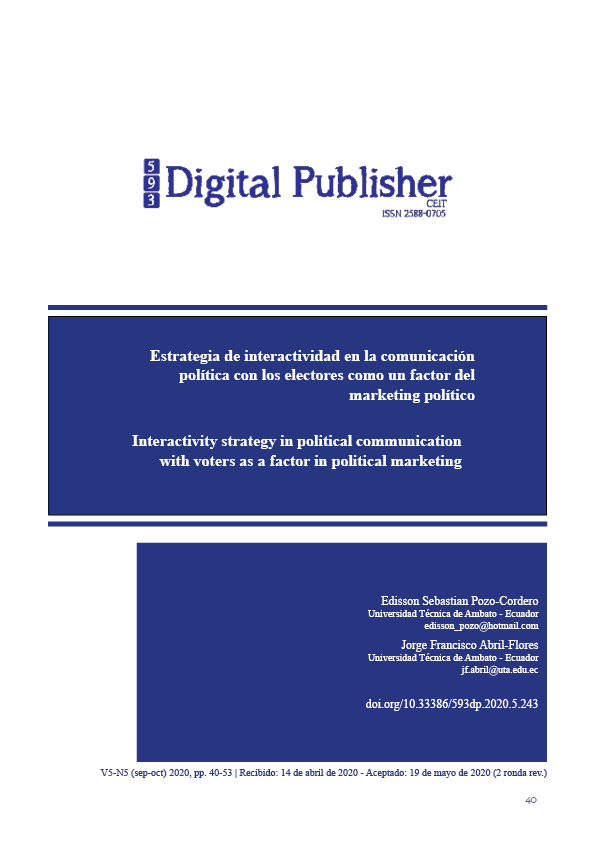Interactivity strategy in political communication with voters as a factor in political marketing
Main Article Content
Abstract
In the present investigation, the analysis of the strategies of interactivity in the political communication with the voters as a factor of the political marketing began, we observed the different means of communication that the political parties use and the opinion of the voters, identifying the media more effective policies to send the message to the voters and make them decide their vote; always focusing the message of the political parties regardless of the means of communication used, whether modern or innovative, the main message never changes, only feedback, the objective of this research was to analyze the most effective means of communication for voters during an electoral process Likewise, it was learned that interactivity strategies in political communication with voters are a factor in political marketing and are framed within the 4Ps of marketing. The approach used is qualitative and quantitative, this allows us to specify characteristics or descriptions of the political communication media that manage to capture the attention of the voters and at the same time obtain statistical data that allows us to observe the most practical interactivity strategies in political communication. within political marketing. The method used is descriptive: as its word indicates, it specifically describes what voters are looking for; the media that significantly influence the decision of the vote and the undoubted support for a political party; Comparative because a comparison is made of the interactivity strategies in political communication used in the past with the interactivity strategies in political communication used today.
Downloads
Article Details
1. Derechos de autor
Las obras que se publican en 593 Digital Publisher CEIT están sujetas a los siguientes términos:
1.1. 593 Digital Publisher CEIT, conserva los derechos patrimoniales (copyright) de las obras publicadas, favorece y permite la reutilización de las mismas bajo la licencia Licencia Creative Commons 4.0 de Reconocimiento-NoComercial-CompartirIgual 4.0, por lo cual se pueden copiar, usar, difundir, transmitir y exponer públicamente, siempre que:
1.1.a. Se cite la autoría y fuente original de su publicación (revista, editorial, URL).
1.1.b. No se usen para fines comerciales u onerosos.
1.1.c. Se mencione la existencia y especificaciones de esta licencia de uso.
References
Abarca, V. (19 de Enero de 2011). PuroMarketing. Obtenido de La comunicación del marketing político en los medios y redes sociales: https://www.puromarketing.com/42/8824/comunicacion-marketing-politico-medios-redes-sociales.html
Bedoya, A. (9 de 1997). ¿Qué es interactividad? Sin papel, 1-3. Obtenido de http://penta3.ufrgs.br/midiasedu/modulo6/etapa1/biblioteca/interactividad.pdf
Boude, O. (2017). Estrategias de aprendizaje para formar en Educación Superior a una generación interactiva. Revista Cubana de Educación Médica Superior(2), 1-14. Recuperado el 20 de 1 de 2020, de https://www.medigraphic.com/pdfs/educacion/cem-2017/cem172l.pdf
Costa, L. (s.f.). LCB Marketing Político. Obtenido de https://www.costabonino.com/ppalabras.htm
EDUCALINGO. (s.f.). Recuperado el 14 de 10 de 2019, de https://educalingo.com/es/dic-es/interactividad
electoral, C. n. (23 de Enero de 2018). Consejo Nacional Electoral. Obtenido de Consejo Nacional Electoral: http://cne.gob.ec/es/?option=com_content&view=article&layout=edit&id=4316
Estrella Osorio, A. V., Palacios García, H. R., & Calvopiña Panchi, K. D. (2019). Comunicación y Marketing Político como elemento de Formación Electoral.. El On y el Off durante la primera vuelta electoral para la elección Presidencial Ecuatoriana en el año 2017. Economía y Negocios, 69-87. doi:https://doi.org/10.29019/eyn.v10i1.537.
Fenoll, V. (2011). Usuarios Activos y Pasivos. La interactividad de la audiencia en los medios digitales. El caso de la fórmula 1 en Valencia. Aposta Revista de Ciencias Sociales, 51, 1-26.
Fernández, D. (7 de Junio de 2016). Soy.marketing. Obtenido de https://soy.marketing/marketing-politico-historia-concepto/
Gil Calvo, E. (2018). Comunicación Política. Caja de Herramientas. Madrid: Loslibros de la Catarata.
Guijarro, E., Babiloni, M. E., & Cardós, M. (16 de 07 de 2015). Las 4 P's del Marketing político. Obtenido de https://riunet.upv.es/handle/10251/53296
Kotler, P., & Armstrong, G. (2013). Fundamentos de Marketing. México: Pearson Educación.
Kotler, P., & Bloom, H. &. (2014). Marleting. Prentice Hall.
León, F. (7 de 9 de 2015). Que es un estudio de mercado. Revista Merca 2.0. Recuperado el 3 de 12 de 2019, de https://www.merca20.com/sabes-que-es-un-estudio-de-mercado/
Lerma, A., Bárcena, S., & Vite, R. (2016). Marketing Político. Mexico: Cengage Learning Editores.
Lerma, H. (2016). Metodología de la Investigación. Bogotá: ECOE Ediciones.
Llopis, E. (2015). Crear la Marca Global: Modelo práctico de cración e internacionalizsación de marcas. ESIC Editorial.
López - García, G. (2017). Comunicación Política y Discursos sobre el Poder. El profesional de la información, 26, 573-578. doi:https://doi.org/10.3145/epi.2017.jul.01
López Rodríguez, C. E., & Ortegón Cortázar, L. (2017). Del marketing político a las comunidades de marca. Un estudio comparativo de partidos políticos en Bogotá D.C. Revista Universidad y Empresa, 9-35. Obtenido de http://www.scielo.org.co/pdf/unem/v19n32/0124-4639-unem-19-32-9.pdf
Maarek, P. J. (2009). Marketing Político y Comunicación Claves para una buena información política. Barcelona: Ediciones Paidós Ibérica.
Mazzoleni, G. (2010). La Comunicación Política. Maddrid: Alianza Editorial.
Ojeda, J. (1995). Información, publicidad y propaganda política en los procesos electorales. Obtenido de http://webs.ucm.es/BUCM/tesis/19911996/S/3/S3013501.pdf#[0,{%22name%22:%22Fit%22}]
Pérez, C. (2016). Comunicación y Marketing Político (7a Edición ed.). Publicaciones Vid. Obtenido de https://www.kas.de/documents/287914/287963/Comunicaci%C3%B3n+y+Marketing+Politico+7ma+Ed.+Carlos+Andr%C3%A9s+P%C3%A9rez.pdf/4437ada2-8da9-56bf-683d-2ffc682ea016
Rengel, G., Orlandini, I., Tolavi, I., Muñoz, V., & Mariano, A. (2016). Marketing Político y las Redes Sociales: Evolución y Prácticas en Sur América.
Reyes, M. C., O´ Quínn, J. A., Gómez, J. M., & Rodriguez, E. (Enero-Abril de 2011). Reflexiones sobre la comunicación política. Espacios Públicos, 14, 85-101. Recuperado el 22 de 11 de 2019, de https://www.redalyc.org/articulo.oa?id=676/67618934007
Rodríguez, A., & Sosa, E. (2018). Interactividad e interacción social: proceso esencial en educación a distancia. Revista Virtual Católica del Norte, 110-127. Obtenido de https://revistavirtual.ucn.edu.co/index.php/RevistaUCN/article/view/999/1447
Sainz, J. (2012). La distribución comercial: opciones estrategicas. Madrid: ESIC Editorial.
Smolak, E., & Castillo, A. (27 de 6 de 2018). Comunicación política y los think tanks. Estrategias de comunicación en las redes sociales. Communication Papers - Media Literacy & Gender Studies, 7(15), 59-74. Recuperado el 20 de 01 de 2020, de https://communicationpapers.revistes.udg.edu/communication-papers/article/view/22183/25951
Vegas, E. (18 de 2 de 2013). Puro Marketing. Recuperado el 3 de 12 de 2019, de http://www.puromarketing.com/42/15279/poder-imagen-mitos-visual-social-media.html#



